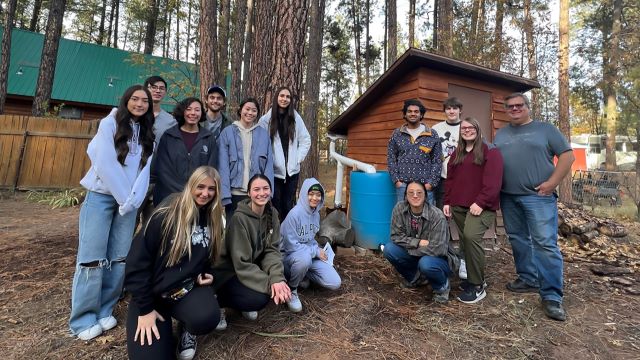
The mission of Engineers Without Borders USA is to build a better world through engineering projects that empower communities to meet their basic human needs.
Currently, the Arizona State University (ASU) chapter of Engineers Without Borders is working on three projects around the state. According to ASU News, one of the student teams is implementing mountain bike trails to encourage eco-tourism and provide local children with after-school activities.
Another student team is building dams to restore irrigation capabilities to a farming community, and the third student team is working to provide solar electricity for sustainable energy, ASU News reported recently.
Aside from the in-state projects, students in the ASU chapter combine their knowledge to help improve access to power and clean water around the world.
Katie Sue Pascavis was a freshman when she became involved in one of the club’s projects in a school located more than 9,000 miles away.Today, Pascavis, a senior mechanical engineering major in the Ira A. Fulton Schools of Engineering and a health major in The College of Liberal Arts and Sciences at ASU, serves as co-president of the club and project lead for the Kenyan International Project.
The ASU Engineers Without Borders chapter has other international projects in progress in Ethiopia. One of them works to provide plastic recycling capabilities for a national park and a nearby town. The area is littered with thousands of plastic water bottles that are left by visitors annually.
According to ASU, the project seeks to implement small-scale shredders and injection machines that can handle the capacity of littered water bottles each year. Shredders reduce the water bottles down to small flakes of plastic, and the injection machines melt the flakes down and mold them into new products such as cups, plates, toys, and even construction materials.
Kaleb Tefera, a project co-lead and second-year computer science major, who grew up in Ethiopia, speaks the language of the region. He told ASU that comes in handy because he can explain any cultural differences to the team.
ASU Engineers Without Borders also partners with universities in Ethiopia to share their design knowledge with local students. They even hope to make the design open source for sustainability efforts around the world.
ASU’s Engineers Without Borders chapter is part of the national professional and student organization Engineers Without Borders USA, which exists to help empower communities around the world to meet basic human needs.
The local professional chapter provides mentorship to the ASU chapter, guiding student teams through each project’s completion. ASU Engineers Without Borders projects also involve corporate and nonprofit partners that donate resources to ensure student initiatives provide maximum impact to the communities they serve.
The club also partners with Engineering Projects in Community Service (EPICS), a social entrepreneurship program that ASU students can also take for course credit.
The U.S. Army Corps of Engineers has been tasked with…
Brown and Caldwell, a leading environmental engineering and construction firm,…
Humboldt State University, one of four campuses within the California…